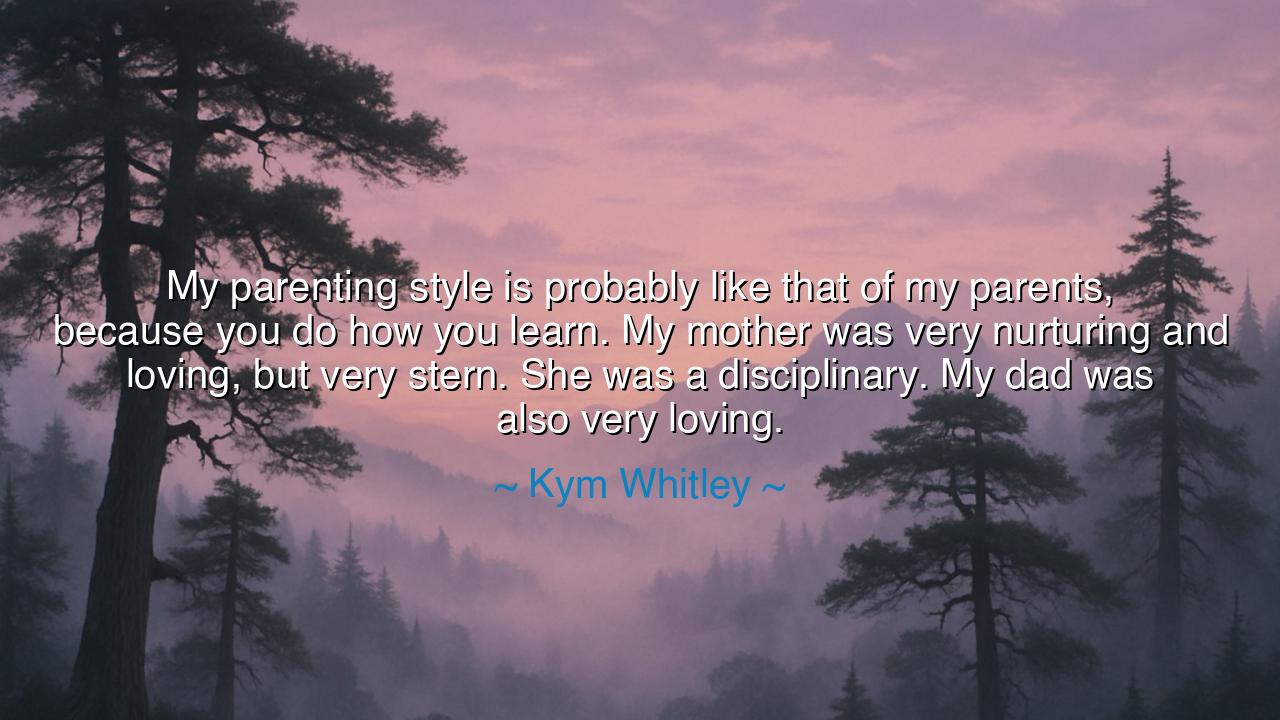
My parenting style is probably like that of my parents, because
My parenting style is probably like that of my parents, because you do how you learn. My mother was very nurturing and loving, but very stern. She was a disciplinary. My dad was also very loving.






In the words of Kym Whitley, there is a truth that crosses generations: “My parenting style is probably like that of my parents, because you do how you learn. My mother was very nurturing and loving, but very stern. She was a disciplinary. My dad was also very loving.” Within these words lies the eternal rhythm of life—that the ways of one generation do not vanish, but echo in the next. For children are not only raised by words, but by example, and the memory of how one was guided shapes the hand that guides in turn.
The ancients knew this well. In the Proverbs of Solomon it is written: “Train up a child in the way he should go, and when he is old, he will not depart from it.” The philosopher Aristotle likewise declared that virtue is learned through habit, passed down by practice rather than instruction alone. Whitley acknowledges this same inheritance: that her own parenting style was not drawn from theory or manuals, but from the living memory of her mother’s nurture and sternness, her father’s steady love. Thus, she reveals that parenthood is as much remembrance as it is invention.
History offers many such testimonies. Consider George Washington, the first president of the United States. Orphaned of his father at a young age, he was largely shaped by his mother, Mary Ball Washington. She was known to be strict, demanding discipline and integrity. Though some found her unyielding, Washington later embodied the same balance of stern duty and steady affection in his leadership, both in his household and in the nation he helped to found. Here we see the principle Whitley describes: “you do how you learn.” A child raised under firm love often carries that pattern forward into their own acts of guidance.
Whitley’s words also carry another truth: that love and discipline are not enemies but companions. Too much sternness without love breeds fear; too much affection without structure breeds weakness. But when the two are joined—when a mother is both nurturing and firm, when a father is both tender and strong—then the child learns balance. This is not an easy harmony to maintain, for parents must constantly weigh mercy against justice, leniency against rule. Yet it is in this dance that the deepest lessons are planted in the hearts of children.
The meaning of her reflection is also humble: she does not claim originality, but continuity. She admits that her own parenting style is a reflection of what she saw and felt as a child. This humility is a teaching for us, for it reminds us to look back before we look forward. Every parent carries within them the imprint of their own upbringing. To recognize it is to gain wisdom, to choose which parts to preserve and which to transform. For though we inherit patterns, we are not bound to repeat them without thought—we are free to shape them anew for the sake of our own children.
The lesson for us is clear. First, let us reflect honestly on the ways our own parents raised us, recognizing the strengths we carry forward and the wounds we must not pass on. Second, let us strive for balance—discipline that does not crush, love that does not spoil. Third, let us remember that parenting is not simply a duty but a legacy: every act of care, every word of correction, every embrace or rebuke will echo in the lives of generations yet unborn.
O seekers of wisdom, remember this: the parenting style of today becomes the memory of tomorrow, and those memories become the seeds from which new styles grow. A stern but loving mother, a tender father—these are not merely private details of one family, but links in the eternal chain of humanity’s growth. Each of us carries within us the voices of our parents, and through us, those voices will either be softened, strengthened, or silenced.
Thus, Kym Whitley’s words endure as a reminder of both inheritance and choice. We are shaped by those who raised us, yet we are also given the power to shape anew. Let us therefore honor the gifts of our parents, learn from their flaws, and pass on to our children not only what we received, but what we have refined. In this way, the cycle of love and discipline continues, purified and strengthened, a living legacy of wisdom.






AAdministratorAdministrator
Welcome, honored guests. Please leave a comment, we will respond soon